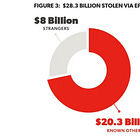Artificial Intelligence: Mastercard’s new Neural Network for enhanced fraud detection
Annual card fraud exceeds $33B, and digital wallet, credit, and debit card use is projected to account for 86% of global POS payments by 2026.
Hi Fintech Futurists —
Today we highlight the following:
AI: Mastercard’s New Proprietary AI Recurrent Neural Network (RNN) for Enhanced Fraud Detection
CURATED UPDATES: Machine Models, AI Applications in Finance, Infrastructure & Middleware
To support this writing and access our full archive of newsletters, analyses, and guides to building in the Fintech & DeFi industries, subscribe below.
In Partnership
Fintech Meetup (March 3-6) is the best place to find new business, partnerships and opportunities. Attendees & sponsors say Fintech Meetup is “the highest ROI event” with reasonably priced sponsorships, tickets, and rooms. Meet everyone for any reason across every use case over 45,000+ double opt-in meetings, and network with 4,000+ attendees.
AI: Mastercard’s New Proprietary AI Recurrent Neural Network (RNN) for Enhanced Fraud Detection
Annual card fraud losses exceed $33B, and digital wallet, credit, and debit card use is projected to account for 86% of global POS payments by 2026. Card fraud detection in these venues is a key application for financial artificial intelligence.
However, current AI fraud detection models fall short in that they tend to decline legitimate transactions due to overly sensitive fraud detection parameters. These false declines cost merchants $443B annually, with "four in ten consumers saying that, if a merchant falsely rejects one of their purchases, they will refuse to shop with that merchant again in the future." The commercial impact is thus even greater than the fraud impact.

In response, Mastercard recently announced Digital Intelligence Pro, its new in-house-built advanced AI model, to address a key issue in current AI fraud detection — biased data leading to high rates of false positive fraud flags.
In traditional AI fraud detection models, the data has more legitimate transactions than fraudulent ones. This imbalance leads to a bias towards predicting the majority class (legitimate transactions), resulting in poor performance in detecting fraud. To address this issue, many AI fraud detection models use Synthetic Minority Oversampling Technique (SMOTE), which works by creating synthetic examples of the minority class (fraud cases) to balance the dataset. However, while SMOTE can improve the ability of a model to detect positive classes (fraud cases), some limitations can lead to a higher instance of false positives due to over-generalization, lack of context, and/or overfitting. All this to say, it’s hard to get the training balance right.
In contrast, Mastercard’s new Digital Intelligence Pro feature uses a recurrent neural network (RNN), trained on data from the roughly 125 billion transactions that go through the company’s card network annually. It uses the history of a cardholder’s merchant visit as the prompt to determine whether the business involved in a transaction is a place the customer would likely go.

The algorithm then assesses the transaction in Mastercard’s network in the form of a score (e.g., is this likely fraudulent?). A higher score reflects the expected pattern of the cardholder, and a lower score is correlated with exceptional behavior. Initial tests demonstrate Digital Intelligence Pro has the capacity to improve fraud detection rates by “20 percent on average,” saving merchants a potential $90B annually in false positive declines.
Making a dent in false positives in fraud detection means fewer legitimate transactions are incorrectly flagged as fraudulent, leading to a smoother experience for cardholders, a significant reduction in the losses due to false positive declines, and less unnecessary investigative work for financial institutions. We like this news from Mastercard — it is at least one (possibly large) step forward in the seemingly ceaseless battle against fraudsters, is deployed against a large existing payment rail, and uses machine intelligence to improve human outcomes.
👑 Related Coverage 👑
Curated Updates
Here are the rest of the updates hitting our radar.
Machine Models
⭐ Wisedocs Secures $9.5m in Series a to Revolutionise Insurtech With AI - Fintech Global
AI Applications in Finance
⭐Deepfake scammer walks off with $25 million in first-of-its-kind AI heist - Ars Technica
⭐ The Dark Potential for Deepfakes in Finance - Fintech Global
Funding for AI in Fintech in Singapore grows 77% H-O-H - Edge Singapore
Infrastructure & Middleware
⭐ Reken Secures $10M in Groundbreaking Seed Funding to Combat Generative AI Threats - Fintech Global
🚀 Level Up
Sign up to the Premium Fintech Blueprint and in addition to receiving our free newsletters, get access to:
Wednesday’s Long Takes with a deep, comprehensive analysis.
Office Hours, digital roundtable discussions.
‘Building Company Playbook’ series, offering insider tips and advice on constructing successful fintech ventures.
Enhanced Podcasts with industry leaders, accompanied with annotated transcripts for deeper learning.
Archive Access to an array of in-depth write-ups covering the hottest fintech and DeFi companies.
Join our Premium community and receive all the Fintech and Web3 intelligence you need to level up your career.





